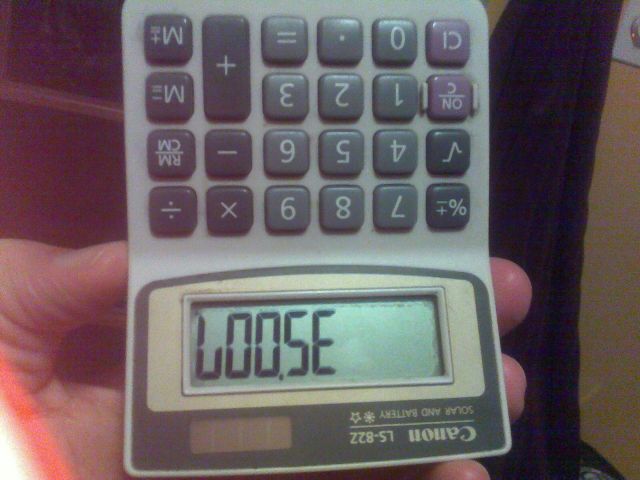In schools across the world, children type a number into their LCD calculator, turn it upside down and erupt into laughter after creating the word 'Boobies'. Of course, this is the most popular word, but there are many other words which can be produced.
All words must be less than 10 letters long, however (the dictionary does contain words long than this however, so you must perform a filter in your program). In this dictionary, there are some uppercase words, so convert the all words the lowercase.
Using, an English language dictionary, create a list of numbers which can be typed into an LCD calculator and makes a word. As with all code golf questions, the shortest program to complete this task wins.
For my tests, I used the UNIX wordlist, gathered by typing:
ln -s /usr/dict/words w.txt
Or alternatively, get it here.

For example, the image above was created by typing the number 35007 into the calculator and turning it upside down.
The letters and their respective numbers:
- b:
8 - g:
6 - l:
7 - i:
1 - o:
0 - s:
5 - z:
2 - h:
4 - e:
3
Note that if the number starts with a zero, a decimal point is required after that zero. The number must not start with a decimal point.
I think this is MartinBüttner's code, just wanted to credit you for it :)
/* Configuration */
var QUESTION_ID = 51871; // Obtain this from the url
// It will be like http://XYZ.stackexchange.com/questions/QUESTION_ID/... on any question page
var ANSWER_FILTER = "!t)IWYnsLAZle2tQ3KqrVveCRJfxcRLe";
/* App */
var answers = [], page = 1;
function answersUrl(index) {
return "http://api.stackexchange.com/2.2/questions/" + QUESTION_ID + "/answers?page=" + index + "&pagesize=100&order=desc&sort=creation&site=codegolf&filter=" + ANSWER_FILTER;
}
function getAnswers() {
jQuery.ajax({
url: answersUrl(page++),
method: "get",
dataType: "jsonp",
crossDomain: true,
success: function (data) {
answers.push.apply(answers, data.items);
if (data.has_more) getAnswers();
else process();
}
});
}
getAnswers();
var SIZE_REG = /\d+(?=[^\d&]*(?:<(?:s>[^&]*<\/s>|[^&]+>)[^\d&]*)*$)/;
var NUMBER_REG = /\d+/;
var LANGUAGE_REG = /^#*\s*([^,]+)/;
function shouldHaveHeading(a) {
var pass = false;
var lines = a.body_markdown.split("\n");
try {
pass |= /^#/.test(a.body_markdown);
pass |= ["-", "="]
.indexOf(lines[1][0]) > -1;
pass &= LANGUAGE_REG.test(a.body_markdown);
} catch (ex) {}
return pass;
}
function shouldHaveScore(a) {
var pass = false;
try {
pass |= SIZE_REG.test(a.body_markdown.split("\n")[0]);
} catch (ex) {}
return pass;
}
function getAuthorName(a) {
return a.owner.display_name;
}
function process() {
answers = answers.filter(shouldHaveScore)
.filter(shouldHaveHeading);
answers.sort(function (a, b) {
var aB = +(a.body_markdown.split("\n")[0].match(SIZE_REG) || [Infinity])[0],
bB = +(b.body_markdown.split("\n")[0].match(SIZE_REG) || [Infinity])[0];
return aB - bB
});
var languages = {};
var place = 1;
var lastSize = null;
var lastPlace = 1;
answers.forEach(function (a) {
var headline = a.body_markdown.split("\n")[0];
//console.log(a);
var answer = jQuery("#answer-template").html();
var num = headline.match(NUMBER_REG)[0];
var size = (headline.match(SIZE_REG)||[0])[0];
var language = headline.match(LANGUAGE_REG)[1];
var user = getAuthorName(a);
if (size != lastSize)
lastPlace = place;
lastSize = size;
++place;
answer = answer.replace("{{PLACE}}", lastPlace + ".")
.replace("{{NAME}}", user)
.replace("{{LANGUAGE}}", language)
.replace("{{SIZE}}", size)
.replace("{{LINK}}", a.share_link);
answer = jQuery(answer)
jQuery("#answers").append(answer);
languages[language] = languages[language] || {lang: language, user: user, size: size, link: a.share_link};
});
var langs = [];
for (var lang in languages)
if (languages.hasOwnProperty(lang))
langs.push(languages[lang]);
langs.sort(function (a, b) {
if (a.lang > b.lang) return 1;
if (a.lang < b.lang) return -1;
return 0;
});
for (var i = 0; i < langs.length; ++i)
{
var language = jQuery("#language-template").html();
var lang = langs[i];
language = language.replace("{{LANGUAGE}}", lang.lang)
.replace("{{NAME}}", lang.user)
.replace("{{SIZE}}", lang.size)
.replace("{{LINK}}", lang.link);
language = jQuery(language);
jQuery("#languages").append(language);
}
}body { text-align: left !important}
#answer-list {
padding: 10px;
width: 50%;
float: left;
}
#language-list {
padding: 10px;
width: 50%px;
float: left;
}
table thead {
font-weight: bold;
}
table td {
padding: 5px;
}<script src="https://ajax.googleapis.com/ajax/libs/jquery/2.1.1/jquery.min.js"></script>
<link rel="stylesheet" type="text/css" href="//cdn.sstatic.net/codegolf/all.css?v=83c949450c8b">
<div id="answer-list">
<h2>Leaderboard</h2>
<table class="answer-list">
<thead>
<tr><td></td><td>Author</td><td>Language</td><td>Size</td></tr>
</thead>
<tbody id="answers">
</tbody>
</table>
</div>
<div id="language-list">
<h2>Winners by Language</h2>
<table class="language-list">
<thead>
<tr><td>Language</td><td>User</td><td>Score</td></tr>
</thead>
<tbody id="languages">
</tbody>
</table>
</div>
<table style="display: none">
<tbody id="answer-template">
<tr><td>{{PLACE}}</td><td>{{NAME}}</td><td>{{LANGUAGE}}</td><td>{{SIZE}}</td><td><a href="{{LINK}}">Link</a></td></tr>
</tbody>
</table>
<table style="display: none">
<tbody id="language-template">
<tr><td>{{LANGUAGE}}</td><td>{{NAME}}</td><td>{{SIZE}}</td><td><a href="{{LINK}}">Link</a></td></tr>
</tbody>
</table>
0.7734for hello or would.7734be acceptable? \$\endgroup\$0.7734is required \$\endgroup\$oligorequires a trailing zero after the decimal:0.6170\$\endgroup\$